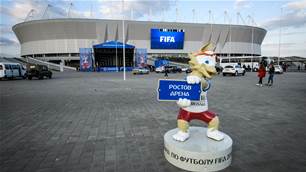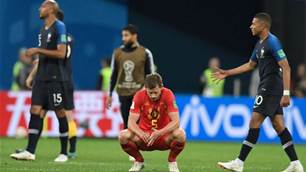ZONAL marking, false nines, Christmas trees and catenaccio – the most basic tools of the managerial trade, right? Paul Simpson argues otherwise...
Tactics don’t win games.” When Harry Redknapp said this, he was pilloried as a managerial Neanderthal, a knuckle-dragging exponent of the blinkered thinking that has hampered English football since the national team were humiliated 6-3 by Hungary at Wembley in 1953.
Yet most coaches probably agree with him.
A young Arsene Wenger prayed his team would win. “Later,” he said, “I thought it would be better to pray for better players.” And Auxerre’s charming coach Jean Fernandez recently told Champions magazine: “At the highest level it isn’t tactics that win games – it’s the players.”
Redknapp made his first-team debut for West Ham in 1965. And when he rounded off
his reflection on tactics by saying, “The numbers game isn’t the beautiful game” he was harking back to the 1960s. Back then, British football writers routinely derided talk of formations and tactics as ‘the numbers game’ – much to the fury of Sir Alf Ramsey, who swore by them. Yet Sir Matt Busby, England’s most successful club manager of the 1960s, happily admitted to Arthur Hopcraft, author of The Football Man, that he hadn’t used a chalkboard to run through tactics at Manchester United in nine months.
Those who sided with Busby, not Ramsey, felt vindicated when the 1970 World Cup was won in captivating style by a superlative Brazilian side that seemed, briefly, to have abolished a tension between the team and the individual that has always marked football. Carlos Alberto, Pele, Rivelino, Tostao – they didn’t play by numbers. Their football was of such beauty that even a hardened pro like Don Howe would, 35 years later, come over all misty-eyed at the mere mention of their training sessions.
How times change. At the 2010 World Cup, five of the world’s best players – Lionel Messi, Kaka, Cristiano Ronaldo, Wayne Rooney and Fernando Torres – all disappointed, as coaches discovered the functional virtues of the 4-2-3-1 perfected by Jose Mourinho’s Inter. If the World Cup proved anything, it was that you can have too much teamwork. As The Guardian’s Rob Smyth said in Intelligent Life magazine: “Individuals are the soul of sport, even team sports.”
One reason Real Madrid’s appointment of Mourinho seems a kind of watershed is that it marks the apotheosis of the cult of the coach and his creed: teamwork. The Special One is the galactico now, using knowledge gleaned from a thousand dossiers to refine his tactics and strategies. It’s not Mourinho’s fault that he is more charismatic than any of the teams he has created, but it is a sign that something is rotten in the state of football.
And that ‘something’ is our obsession with tactics. The Guardian’s Barry Glendenning lambasted the “bulls**t artists who try to complicate a perfectly simple game by waffling on interminably about formations and tactics… in a bid to make out they’re cleverer than anyone else. There is, of course, a time for such talk, but as somebody clever once said about analysing humour, dissecting football to that degree is like dissecting a frog. Nobody is particularly interested – and the frog dies.”
Glendenning is half right. Far too many people are fascinated by the tactical complexities of this simple game. But the frog still dies. We can blame or credit computer games, the Americanisation of analysis (we seem to suffer from a statistical inferiority complex compared to baseball and NFL), the internet and insight wars between pundits. None of us, I suspect, are immune to the suspicion – fuelled by UK pundits Alan Hansen, the recently shamed Andy Gray and Jonathan Wilson’s seminal tactical tome Inverting The Pyramid, plus our own Craig Foster on SBS – that if we dig deep enough we will find a kind of Da Vinci Code; a formula that solves the mystery of football.
Continued on next page...
"Football is a simple game - players make it complicated"
This isn't to say tactics don't matter; just that they don't always matter the most. Despite what the media - and certain coaches - insist, results aren't always decided by a clever formation or ingenious ploy from the wizard in the dugout.
A rule of thumb in business is that a manager only controls 10 per cent of the variables that determine success or failure. The weather, pitch and officials are just three variables the coach can't do a lot about. And there are so many other factors a coach can only partially influence: club culture, injuries, the barely fathomed mystery of form, the club's infrastructure. If you miss out on a star player because your club faxed its bid rather than picking up the phone - yes, this happened - you can't rectify that.
Coaches probably like talking about tactics because it fosters the morale-boosting belief that they can shape their destiny. If they can drill systems, formations and moves into their players, they can reduce the risk of defeat - and unemployment. As bystanders, we love talking tactics because it feeds our secret conviction that we'd do a better job in the dugout. Besides, it doesn't require rocket science to waffle about inside-out wingers, Brazil's diagonal 4-2-3-1 and whether Luciano Spalletti's Roma really reinvented Total Football. (Not everyone who gushes about Spalletti's Roma is a tactical bore, but all tactical bores can explain, in stultifying detail, why Spalletti's Roma were so innovative.)
It is reassuring for us to believe football is a predictable business of cause and effect. And
as we can always find a tactical explanation for a win, draw or defeat, we ignore the slender margin of success. When Inter beat Barcelona in last year's Champions League semi-final by protecting their area with a determination reminiscent of the Alamo's defenders, Mourinho was hailed a tactical genius. His plan worked. But if Yaya Toure hadn't been harshly penalised for a handball when Bojan scored in injury time, Inter would have lost on away goals.
Terry Venables liked to remark that "football is a simple game," before adding the caveat, "It's the players who make it complicated." Players complicate football in many ways. They may misunderstand instructions, lie about their fitness or just take it easy. And because footballers need an ego to survive, they will often depart from Plan A and take the initiative, ignoring furious reprimands from the dugout by, as Ray Wilkins would say, "copping a deaf 'un".
Sometimes, they complicate football by being geniuses. When Sven-Goran Eriksson started coaching he set out to be "as hard as nails on tactical discipline" but, managing Roberto Mancini at Sampdoria in the 1990s, he changed his mind. "If I had been a strict disciplinarian with Mancini," he said, "he would have been a poor player. He could find solutions on the pitch you couldn't find in any textbook."
The cult of the coach, and their presumed mastery of the arcane mysteries of football tactics, means fewer players are trusted to find their solutions. Messi's marginalisation in South Africa was a sublime example of this ridiculous tendency. It was his peculiar fate to be converted into a kind of playmaker for the good of the team (and especially Carlos Tevez) by Diego Maradona, who had won the World Cup, in part, because entire teams were built around his miraculous genius. One of the roots of Rooney's discontent may
be the realisation that he may never taste the freedom on the pitch that his boyhood idol,
El Diego, enjoyed only 20 years ago. In South Africa, the English looked to Rooney for imaginative magic, forgetting that players like him are schooled in obedience most of the time.
If tactics trump all, football does become a kind of number's game, paving the way for zealots like Wing Commander Charles Reep, the self-appointed football analyst who 'proved' through statistics that though England lost 6-3 to Hungary in 1953, the idea that the Mighty Magyars were the better side was a "myth". Reep's analysis proved 70 to 80 per cent of goals come from moves of three passes or fewer. As Barney Ronay points out in The Manager, Reep had to include direct free-kicks to come up with this figure and based his analysis purely on English football. But Reep's statistical certainty was appealing to managers like Graham Taylor and may explain why, as England boss, he drafted in 78 players in three and a half years but not Chris Waddle, who very nearly won the European Cup with Marseille.
Continued on next page...
"Football should leave room for freedom of expression"
All this would be easier to understand if there was overwhelming evidence that tactics really did conquer all. But how many trophies have tactics actually won? Since 2000, only two and a half teams have won the Champions League through sheer tactical virtuosity. The two? Mourinho's Porto (2004) and Inter (2010).
The half? Pep Guardiola's Barcelona in 2009, who took Arrigo Sacchi's pressing game to
a new artistic peak. But Pep had some seriously decent players. Only two coaches have won the European Cup/Champions League and the World Cup: Marcello Lippi and Vicente del Bosque. Neither are great tactical innovators. And the two most admired teams in the history of football - Real Madrid (1960) and Brazil (1970) - were hardly tactically revolutionary.
The biggest recent triumph of tactics over players was Otto Rehhagel's Greece winning Euro 2004. No one outside Greece will recall the tournament with much affection, but his use of man-marking, a sweeper and a five-man midfield was an innovative throwback that flummoxed France, the Czech Republic and Portugal.
The three most tactically innovative teams since World War II are probably Hungary's Mighty Magyars, Ajax's Total Footballers and Sacchi's Milan. All three pioneered a radically different playing style and had some of the greatest players ever to grace the game. Was the Hungary side that demolished England in 1953 great because of the vision of coach Gusztav Sebes - or the transcendent genius of Ferenc Puskas, Nandor Hidegkuti and Sandor Kocsis? Ajax wouldn't have won three European Cups in a row without Michels' meticulous team-building - or the solutions Johan Cruyff devised on the pitch. And did Sacchi's Milan really belong to him - or Franco Baresi, Ruud Gullit, Paolo Maldini, Frank Rijkaard and Marco van Basten?
Reflecting on England vs Hungary in 1953 in Inverting The Pyramid, Wilson initially insists: "It was because of tactics that Hungary won." But a few lines later, he admits: "While the tactics permitted the technique to flourish, without the technique the tactics would have been redundant." (The argument can run on: did Michels pick the players to suit Total Football or did watching geniuses like Cruyff inspire him to envisage a revolutionary style of play?). It is hard, too, to draw conclusive lessons from Mourinho's triumphant first season at Chelsea. He won 16 more league points in 2004-05 than Claudio Ranieri in 2003-04 (like the Tinkerman, though, he could only reach the Champions League semi-finals). But he spent over £91m ($146m) on new players, bringing in Didier Drogba, Petr Cech, Ricardo Carvalho and Arjen Robben. Which mattered more in Chelsea's first league title in 50 years: Mourinho's tactical acumen or the signing of four world-class stars?
Bob Paisley, still the only coach to win three European Cups, didn't have much truck with tactics, once saying to Joe Fagan: "What does 'going round the back' mean? We're not burglars, are we?" It is easy to say the game has changed since the 1970s but Lippi's Juventus, which reached three Champions League finals in a row, weren't too shabby to watch. Lippi's particular genius was to find a system to suit the geniuses he had on the pitch. His Bianconeri exemplified Wilson's observation that "success on the pitch - in the best case - stems from the symbiosis of theory and the players available".
Wenger's tactical skill is routinely questioned but his philosophy of football seems sound: "There is always a balance to strike. Football is first and foremost a game. It has a framework but it should leave room for freedom of expression." If we don't strike the right balance we may soon echo Bobby Charlton who, having watched England play like turnips under Taylor, asked: "Whatever happened to football?"
This article appeared in the April 2011 issue of Australian FourFourTwo magazine. To buy back copies of this issue call 03-8317-8121 with a credit card to hand.
Related Articles

Argentina Football Association Arranges Head Coach Sampaoli's Exit Terms - Reports

Southgate not judging Kane for England's loss












